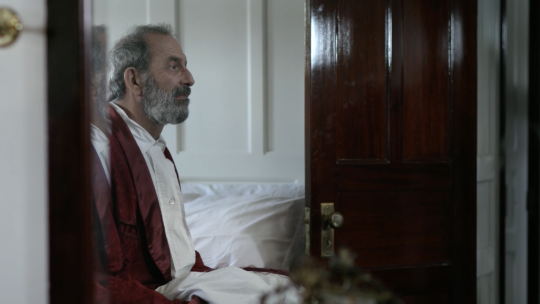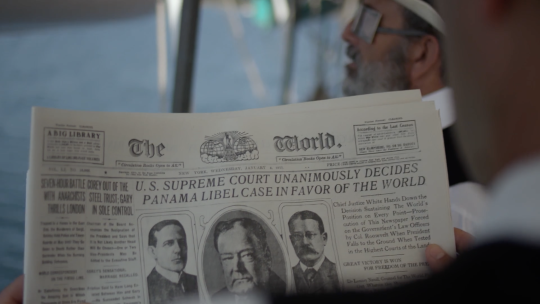Conversations | Oren Rudavsky on “Joseph Pulitzer: Voice of the People”
New documentary, which highlights Pulitzer’s legacy in the newspaper industry, will make its television premiere on PBS on Friday, April 12.
Joseph Pulitzer: Voice of the People follows the famed newspaper publisher’s legacy in the industry, foregrounding his commitment to freedom of the press. The documentary film, directed by Oren Rudavsky and Fiscally Sponsored by The New York Foundation for the Arts (NYFA), followers Pulitzer’s beginnings in journalism while exploring the professional and personal trials he faced throughout his journey. It answers the question: “How did Joseph Pulitzer, once a penniless young Jewish immigrant from Hungary, come to challenge a popular president and fight for freedom of the press as essential to our democracy?”
Joseph Pulitzer: Voice of the People will be screened at The Morgan Library & Museum on Friday, March 29 at 7:00 PM. Rudavsky will be in attendance to introduce the film, which will be followed by a discussion with historian David Nasaw. The documentary will also make its television premiere on Friday, April 12 at 9:00 PM on PBS (check local listings) and on American Masters beginning Saturday, April 13.
NYFA had the opportunity to speak with Rudavsky about his inspiration and process behind Joseph Pulitzer: Voice of the People. Read the interview below:
NYFA: What sparked your interest to direct a documentary about the life of Joseph Pulitzer?
Oren Rudavsky: In 2013, Bob Seidman (the film’s co-writer and producer), whom I have previously worked with on a film, approached me with the idea of making a film about Joseph Pulitzer. All I knew about Joseph Pulitzer was that he had created the Pulitzer Prizes. When I started to dig into who Joseph Pulitzer was, I realized that he was not only a really interesting guy, but that he was quite relevant to today’s America, living in a country run by the Trump Administration. Pulitzer published everything he thought was news and didn’t care who he harmed, making him an equal opportunity offender and critic of the way things are in the world. He was just a fascinating person to make a film about.

NYFA: Working on this documentary must’ve brought along some notable anecdotes. Are there any you wish to share?
OR: One of the joys of working on this film was working with the incredible talent brought to bear. This involved working with Adam Driver as the narrator as well as other voice actors (Liev Schreiber, Tim Blake Nelson, Rachel Brosnahan, Lauren Ambrose, Hugh Dancy, Billy Magnussen, Sebastion Stan, Ryan James Hatanaka) whom we got to share some time with. Each actor brought their own talents to the table such as their accents and acting styles of all sorts. These folks were all professionals and knew how to deliver. The other aspect of this film that was spectacular was finding a period boat up in Maine to shoot the boat sequences offshore, through fog and waves. My favorite moment was when Bob Seidman drifted off in a rowboat with our talent. They drifted off into the thick fog and we thought we’d never see them again. Luckily we had a motor boat that went after them, but that disappeared as well. After a heart-pounding 15 minutes, they reappeared and production was saved.

NYFA: Your documentary brings forth a prime example of aggressive journalism and freedom of the press during the late 19th and early 20th centuries. What from Pulitzer’s legacy do you feel has bears the most weight in today’s journalism?
OR: One thing primarily relevant about Pulitzer today has to do with what’s going on politically with a president who seems to disrespect the news media, and that is identical to the conflict between presidents and the press in Pulitzer’s era. He had to take on Teddy Roosevelt over improprieties having to do with the building of the Panama Canal. Those were stories that Pulitzer delved into. Because this was infuriating to Teddy Roosevelt, his administration created a smear campaign against Pulitzer. Sounds a little familiar? But Pulitzer took Teddy Roosevelt to the Supreme Court, and it was a remarkable time.

NYFA: Did you encounter any surprises while gathering archival information on Pulitzer’s life and newspaper companies? If so, was there anything you wish you could’ve added to the film?
OR: Though not shown in the film, one tragedy I came to realize was coming across libraries that have systematically destroyed the originals of newspapers in favor of microfilm, which just simply does not preserve the tactile or visual quality of those newspapers. At Duke, however, I was able to see the original newspaper prints in its best-preserved quality making one see the history of those newspapers, the beauty of the illustrations and the typography, and you can’t really understand it until you have a newspaper in your hands. I could’ve spent hours flipping through every page because it was just filled to the brim with interesting stories, and through my archival digging I understood immediately why Pulitzer was so fabulously successful before internet and TVs.
Why did you choose NYFA Fiscal Sponsorship?
OR: The staff at NYFA is extremely responsive and helpful in helping with submission of grant proposals and funding issues. They are lovely people and that is one key reason I work with NYFA. The system works very well. I know I am working with highly-responsible and competent people.
-Interview conducted by Eleysha Sajous, Fiscal Sponsorship Intern
Are you an artist or a new organization interested in expanding your fundraising capacity through NYFA Fiscal Sponsorship? We accept out-of-cycle reviews year-round. No-fee applications are accepted on a quarterly basis, and our next deadline is March 31. Click here to learn more about the program and to apply. Sign up for our free bi-weekly newsletter, NYFA News, for the latest updates and news about Sponsored Projects and Emerging Organizations.
Images: Courtesy of Oren Rudavsky





